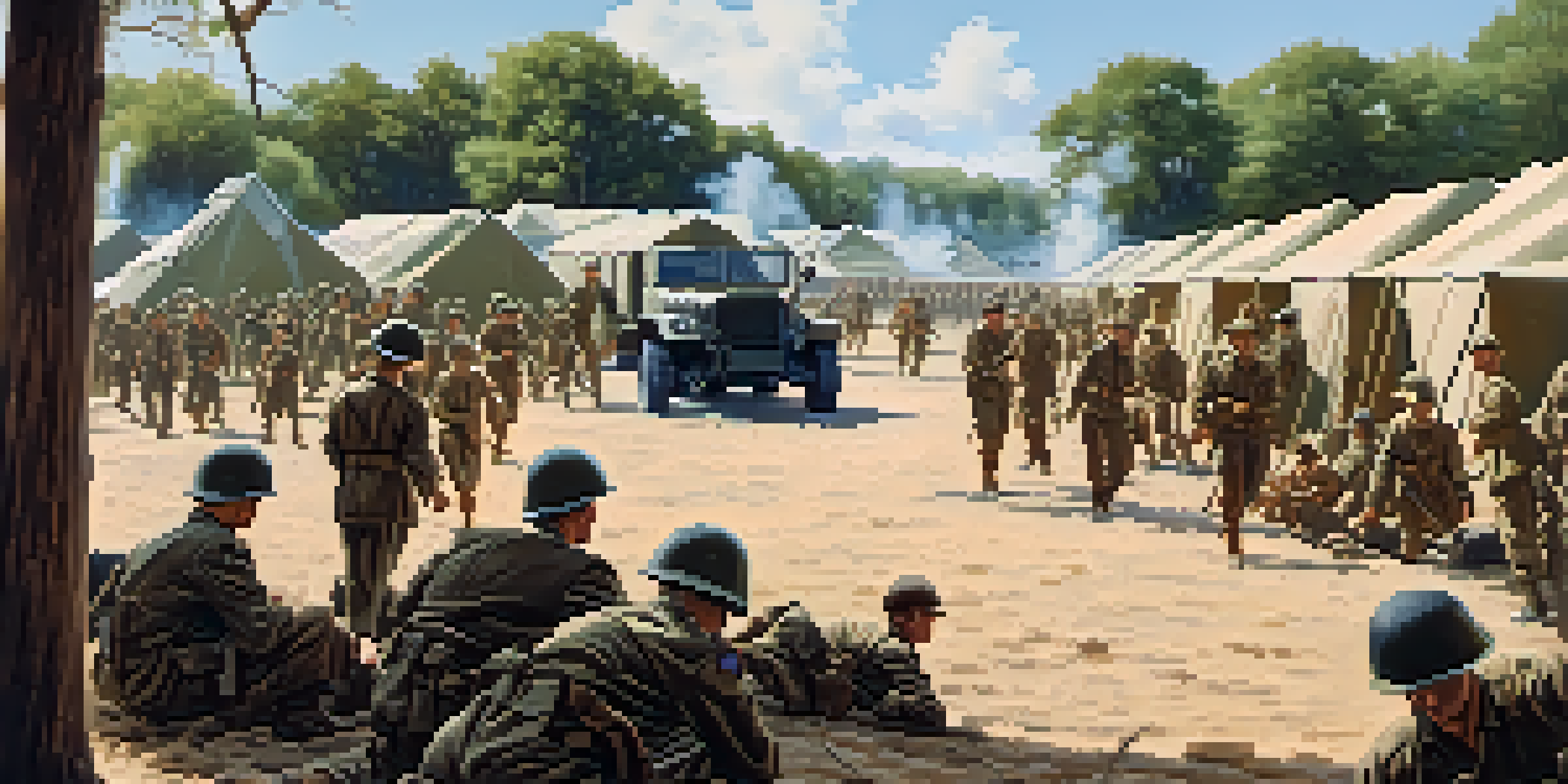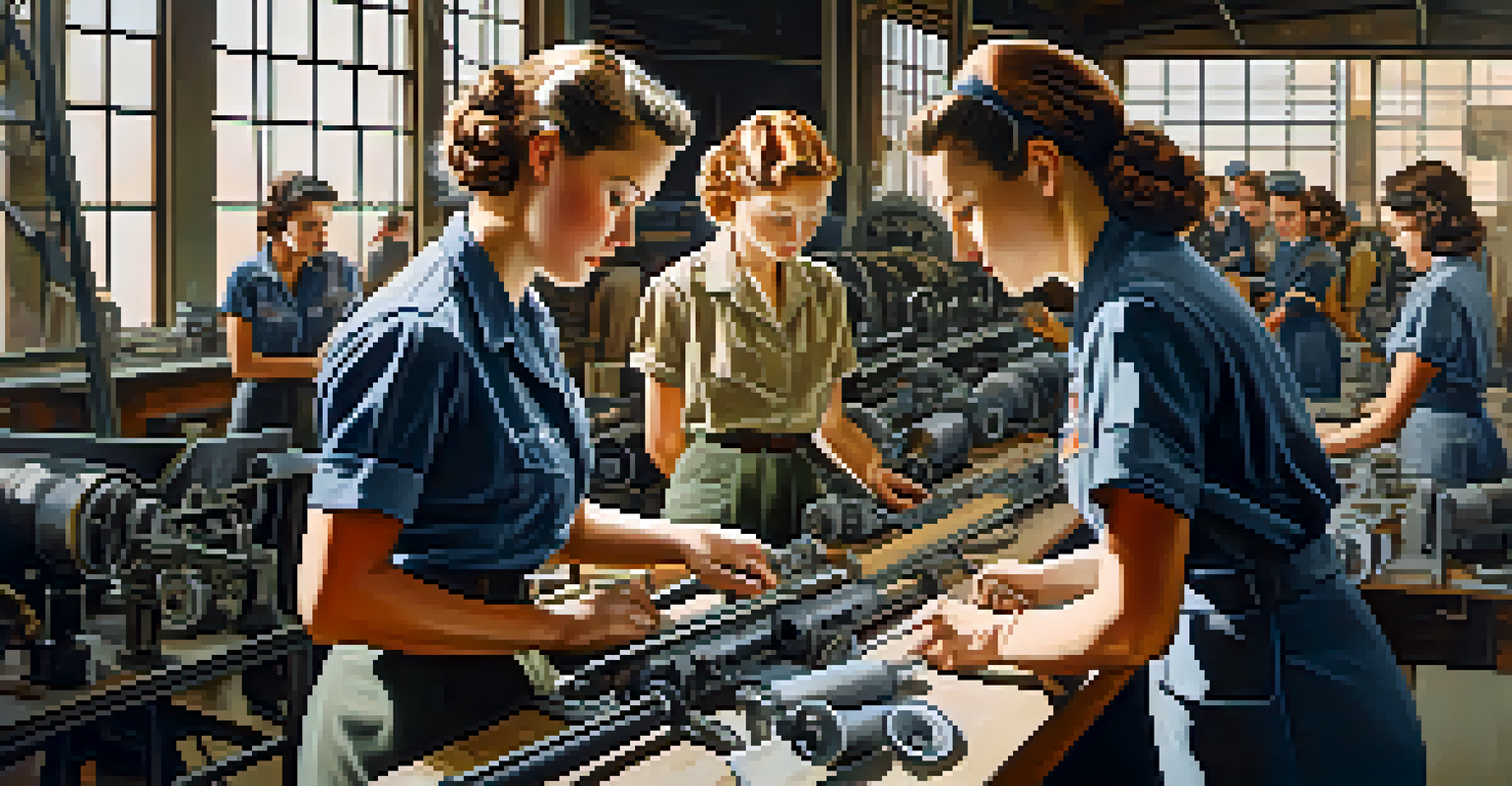Texas in World War II: Contributions and Challenges Faced

Overview of Texas's Role in World War II
During World War II, Texas emerged as a significant player in the war effort. With its vast resources and strategic location, the state became a hub for military training and supply. The establishment of numerous bases, including Fort Hood and Camp Bowie, transformed Texas into a vital center for troops preparing for combat.
The greatest weapon against stress is our ability to choose one thought over another.
The state's contributions weren't just limited to military personnel; Texas industries ramped up production to support the war. From aircraft manufacturing to oil production, Texas's economy shifted dramatically to meet the demands of the war. This shift not only boosted the state's economy but also created thousands of jobs for Texans.
Moreover, the spirit of Texan patriotism played a crucial role during this period. Citizens rallied together to support the troops, contributing through volunteer efforts and war bond drives. This strong sense of community showcased the resilience and determination of Texans during challenging times.
Military Training and Bases Established in Texas
Texas became home to multiple military training facilities, vital for preparing soldiers for the battlefield. The sheer size of the state allowed for extensive training grounds, which were essential during a time when rapid troop mobilization was necessary. Fort Bliss, for instance, was instrumental in training artillery units for the war.

These bases not only served as training grounds but also as staging areas for troops deploying overseas. The facilities were bustling with activity as soldiers learned vital skills and honed their abilities. This infrastructure was crucial in ensuring that troops were battle-ready and well-prepared for the challenges ahead.
Texas's Industrial Boom During WWII
Texas industries shifted to wartime production, significantly contributing to the military's needs and transforming the state's economy.
Additionally, the presence of military bases transformed local communities. Towns near these installations experienced growth as they catered to the needs of soldiers and their families. This influx of personnel brought economic opportunities and fostered a unique relationship between military and civilian life in Texas.
The Impact of Texas Industries on the War Effort
As the war escalated, Texas industries quickly pivoted to produce materials necessary for the military. Factories began churning out everything from tanks to airplanes, significantly contributing to the overall war effort. The state's rich natural resources, particularly oil, played a crucial role in fueling the military machinery.
In war, there are no unwounded soldiers.
Texas's large agricultural sector also made significant contributions, providing essential food supplies for troops. Farmers worked tirelessly to ensure that soldiers received the nourishment they needed, even as many men left for the front lines. This agricultural backbone sustained both the military and the home front during the war years.
Moreover, this industrial boom sparked a transformation in the Texas economy. The state began to diversify its economic base, laying the groundwork for future growth. This newfound industrial prowess not only contributed to the war effort but also reshaped Texas's economic landscape in the years that followed.
Challenges Faced by Texans During the War
Despite the contributions, Texans faced numerous challenges during World War II. Rationing became a way of life, affecting everything from food to fuel. Families had to adapt to limited supplies, which brought about a sense of sacrifice that was felt across the state.
Moreover, the loss of life weighed heavily on communities. Many Texan families received news of loved ones who did not return, creating a profound sense of grief and loss. These emotional challenges were compounded by the physical struggles of adapting to wartime restrictions and changes.
Cultural Unity Amidst Diversity
The war brought together diverse backgrounds in Texas, fostering a sense of community and cultural exchange that enriched local traditions.
Additionally, social issues such as segregation and inequality persisted during this period. While many Texans worked together for the common cause, the realities of discrimination and civil rights challenges remained. This duality showcased the complexity of life in Texas during World War II, highlighting both the unity and divisions present.
Women’s Contributions to the War Effort in Texas
Women in Texas played a pivotal role during World War II, stepping into jobs left vacant by men who went off to fight. They took on responsibilities in factories, farms, and military support roles, showcasing their resilience and capability. The iconic image of 'Rosie the Riveter' resonated deeply, inspiring many Texan women to participate in the workforce.
Additionally, women volunteered for organizations like the Red Cross, providing crucial support to soldiers and their families. They organized drives for supplies and helped care for wounded veterans, demonstrating compassion and dedication to the war effort. Their contributions were essential in sustaining morale on the home front.
This period also marked a significant shift in gender roles, as women proved their ability to perform jobs traditionally held by men. The war prompted conversations around women's rights and equality, laying the groundwork for future advancements. The legacy of these contributions continues to inspire generations of women in Texas and beyond.
Cultural Shifts in Texas During the War
World War II brought about significant cultural shifts in Texas, as the state became a melting pot of diverse backgrounds. The influx of soldiers and workers from various regions created a rich tapestry of cultural interactions. This blending of traditions enriched Texan communities, fostering a sense of unity amid diversity.
Furthermore, the challenges of wartime spurred artistic and creative expressions. Many artists, writers, and musicians found inspiration in the events of the time, producing works that reflected the struggles and triumphs of the era. This cultural output served as a powerful means of processing the experiences of war.
Women’s Workforce Transformation
Women in Texas stepped into crucial roles during the war, marking a significant shift in gender roles and laying the groundwork for future advancements in equality.
The war also influenced local traditions and community events. Citizens came together to support troops, often organizing parades and celebrations to honor their service. These gatherings not only boosted morale but also solidified a shared identity among Texans during a time of uncertainty.
Post-War Texas: Legacy of World War II
The end of World War II marked a transformative period for Texas, as the state began to reap the benefits of its wartime contributions. The economic growth initiated during the war laid the foundation for Texas's post-war prosperity. Industries that thrived during the conflict continued to expand, creating a more diverse economy.
Moreover, the experiences and sacrifices of Texans during the war influenced social change in the years that followed. The conversations sparked by the war regarding civil rights and gender equality began to take center stage, leading to significant advancements in these areas. This legacy of activism and change would shape Texas for decades to come.

Lastly, the memories of World War II remain embedded in the culture and identity of Texas. From memorials honoring fallen soldiers to annual celebrations of service, the state continues to recognize and honor the contributions of those who served. This enduring legacy serves as a reminder of the resilience and strength of Texans during one of the most challenging times in history.